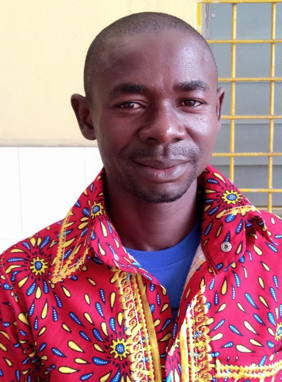
Joseph Landu is a 41-year-old horticulturist who lives in the Commune of Masina in Kinshasa, Democratic Republic of Congo (DRC). Last year, Joseph experienced repeated episodes of high fever and severe tiredness. This made him so exhausted that he could not keep up with his farming. In spite of this, Joseph did not want to go to the hospital for a health check—much to the dismay of his wife.
One day, a team of three community health workers knocked on Joseph’s door. After introducing themselves, they offered him an HIV test as part of community testing activities that the Masina 2 Health Zone had organized jointly with the IHAP-Kinshasa project, led by the Elizabeth Glaser Pediatric AIDS Foundation (EGPAF).
“After receiving useful education about HIV/AIDS issues, I consented to get tested for HIV because I saw no disadvantage in knowing my status,” says Joseph. “I received counseling. Then my blood was collected, and I tested positive for HIV.”
“I refused to accept my HIV positive status,” Joseph continues. “So the IHAP-Kinshasa team members offered to go with me to the St. Hilaire Health Center for confirmation testing.”
I consented to get tested for HIV because I saw no disadvantage in knowing my status
“When I arrived [at the health center], a health worker tested me for a second time, and my HIV positive status was confirmed,” says Joseph. She urged me to begin treatment on the same day. [But] I refused to initiate the antiretroviral therapy because I felt like thunder was about to fall down on me,” remembers Joseph “I thought a death sentence had been passed on me.”
Fortunately, the EGPAF-trained nurse encouraged Joseph to start treatment, to join the support group, and to continue living. “Do not lose your hope and your life expectancy,” Joseph recounts the advice he received, “Being infected with HIV is not a death sentence anymore. Keep taking your medicines as recommended so that you remain safe and live normally like anyone else”.
“Many people you see living around you are HIV positive, but you cannot know that because they are taking their medicines. Adhere to treatment, and respect all medical recommendations from health care providers at the facility. Also, listen to what your peers tell you during support group meetings. If you do these things, you will live for a long time. HIV will just be contained in your blood and will not cause opportunistic infections,” Joseph remembers.
These words empowered Joseph to initiate antiretroviral treatment on the same day that he was tested. Today, after six months of treatment, Joseph is healthy and handling his farming duties well.
“I no longer have strong fevers, tiredness, or headache attacks as in the past,” says Joseph.
Now, Joseph has fully accepted his HIV-positive status and has even enrolled in the IHAP-Kinshasa project’s community team as a volunteer. “Every week, I work for three days on my farms and three days at the facility,” he beams.
I decided to join the volunteer team that helped me to know my HIV status—so that I can also be in service of those who are still not aware of their HIV status.
Joseph has also brought his wife and his five children to the health center for HIV testing. His wife and one child tested positive and are on treatment. With a spirit of giving back, Joseph’s wife is enrolled as a prevention of mother-to-child HIV transmission (PMTCT) volunteer at another facility, which is also supported by EGPAF.
“I am grateful to the IHAP-Kinshasa project team for the technical and psychological support I received. And I am grateful to the U.S. President’s Emergency Plan for AIDS Relief (PEPFAR) and the U.S. Agency for International Development (USAID) for valuable funding related to the HIV door-to-door testing,” concludes Joseph.




